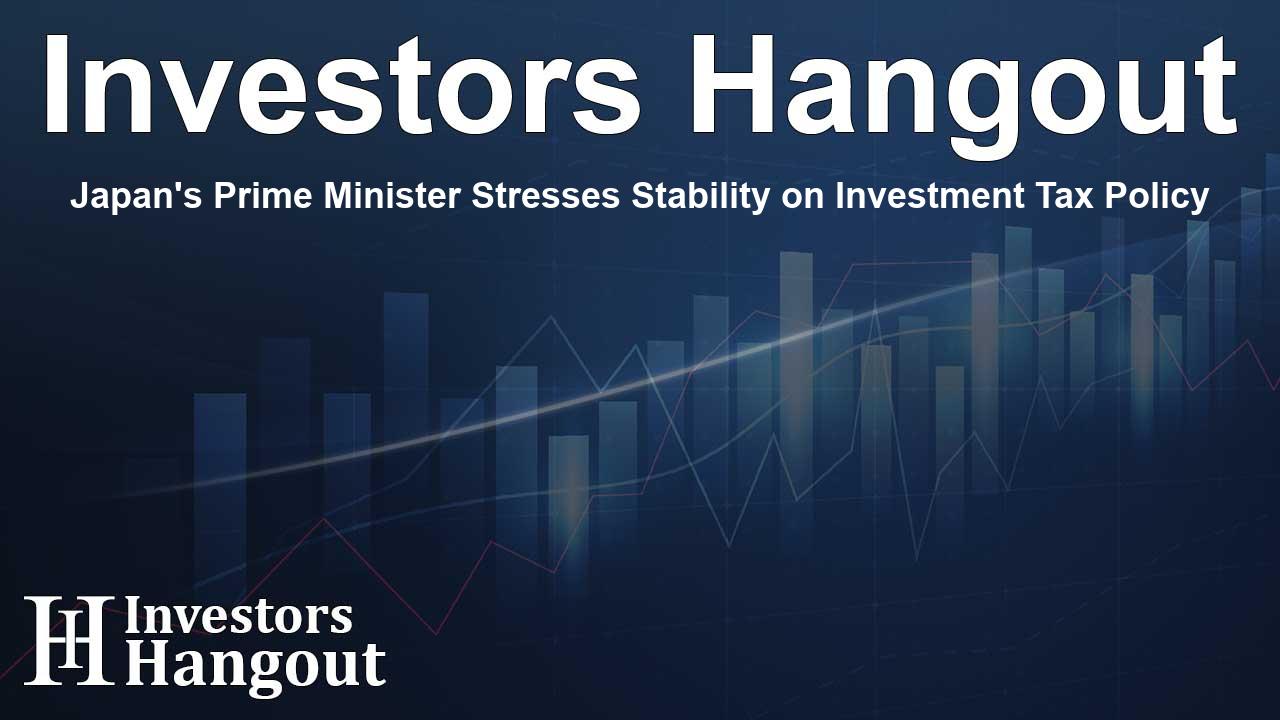Japan's Prime Minister Stresses Stability on Investment Tax Policy

Japan's Commitment to Investment Stability
The political landscape in Japan is currently witnessing a focus on economic stability, as Prime Minister Shigeru Ishiba has recently made a significant declaration regarding investment taxation. He has ruled out any immediate plans to increase the capital gains tax, a crucial aspect for investors in the country.
Ishiba's Stance on Capital Gains Tax
During a parliamentary session, Ishiba emphasized that he is not considering raising the tax on income derived from investments at this moment. This announcement brings a sense of reassurance to both individual and institutional investors who are concerned about potential tax hikes that could impact their financial returns.
The Importance of Investment Income
Investment income in Japan covers various areas, including capital gains from stock and property sales, as well as dividends and interest earnings from savings and government bonds. These income streams are subject to a flat capital gains tax rate of 20%, which is notably more favorable compared to progressive income tax rates that can escalate up to 45% for salaries.
The Rationale Behind the Tax Structure
The current flat-rate tax system has been designed to promote investment by lowering the financial burden on high-income individuals, who often benefit more from investment earnings. Ishiba's assurance regarding the tax structure is a strategic move, reinforcing Japan's commitment to fostering a business-friendly environment.
Future Economic Insights
Looking ahead, it is evident that the stability of tax policies plays a vital role in attracting foreign investment and promoting domestic economic growth. Investors can feel secure knowing that the Prime Minister has ruled out changes to the capital gains tax at this time, allowing them to plan their investment strategies with more certainty.
Conclusion: A Stable Path Forward for Investors
Prime Minister Ishiba's recent statements reflect a broader intention to maintain economic stability and support a robust investment climate in Japan. As the government takes careful steps to encourage investment without escalating tax burdens, investors can continue to engage confidently in the market.
Frequently Asked Questions
What did Prime Minister Ishiba announce about capital gains tax?
He announced that there are currently no plans to raise the capital gains tax on investment income.
What is the current rate of capital gains tax in Japan?
The capital gains tax in Japan is set at a flat rate of 20%.
How does the capital gains tax affect high-income earners?
The flat-rate system benefits high-income earners by minimizing their tax burden compared to progressive income tax rates.
Why is investment income significant in Japan?
Investment income includes critical sources such as capital gains, dividends, and interest, which play an essential role in the economy.
What does Ishiba's announcement mean for future investments?
It provides reassurance to investors, encouraging them to invest confidently without fears of immediate tax increases.
About Investors Hangout
Investors Hangout is a leading online stock forum for financial discussion and learning, offering a wide range of free tools and resources. It draws in traders of all levels, who exchange market knowledge, investigate trading tactics, and keep an eye on industry developments in real time. Featuring financial articles, stock message boards, quotes, charts, company profiles, and live news updates. Through cooperative learning and a wealth of informational resources, it helps users from novices creating their first portfolios to experts honing their techniques. Join Investors Hangout today: https://investorshangout.com/
Disclaimer: The content of this article is solely for general informational purposes only; it does not represent legal, financial, or investment advice. Investors Hangout does not offer financial advice; the author is not a licensed financial advisor. Consult a qualified advisor before making any financial or investment decisions based on this article. The author's interpretation of publicly available data shapes the opinions presented here; as a result, they should not be taken as advice to purchase, sell, or hold any securities mentioned or any other investments. The author does not guarantee the accuracy, completeness, or timeliness of any material, providing it "as is." Information and market conditions may change; past performance is not indicative of future outcomes. If any of the material offered here is inaccurate, please contact us for corrections.